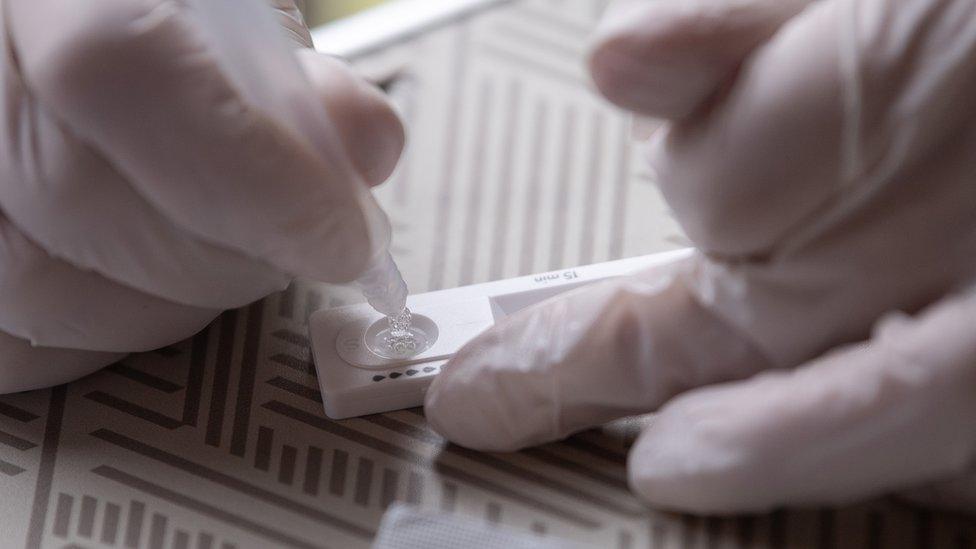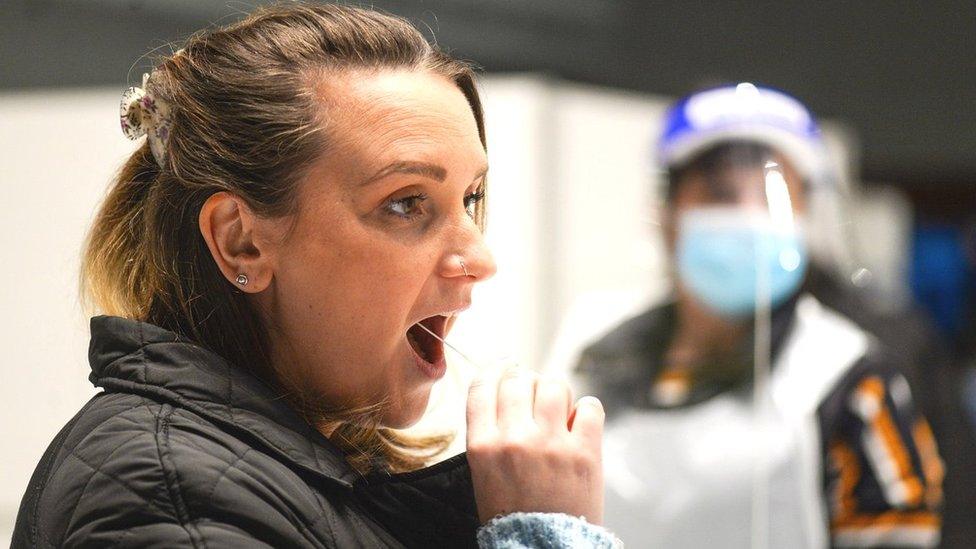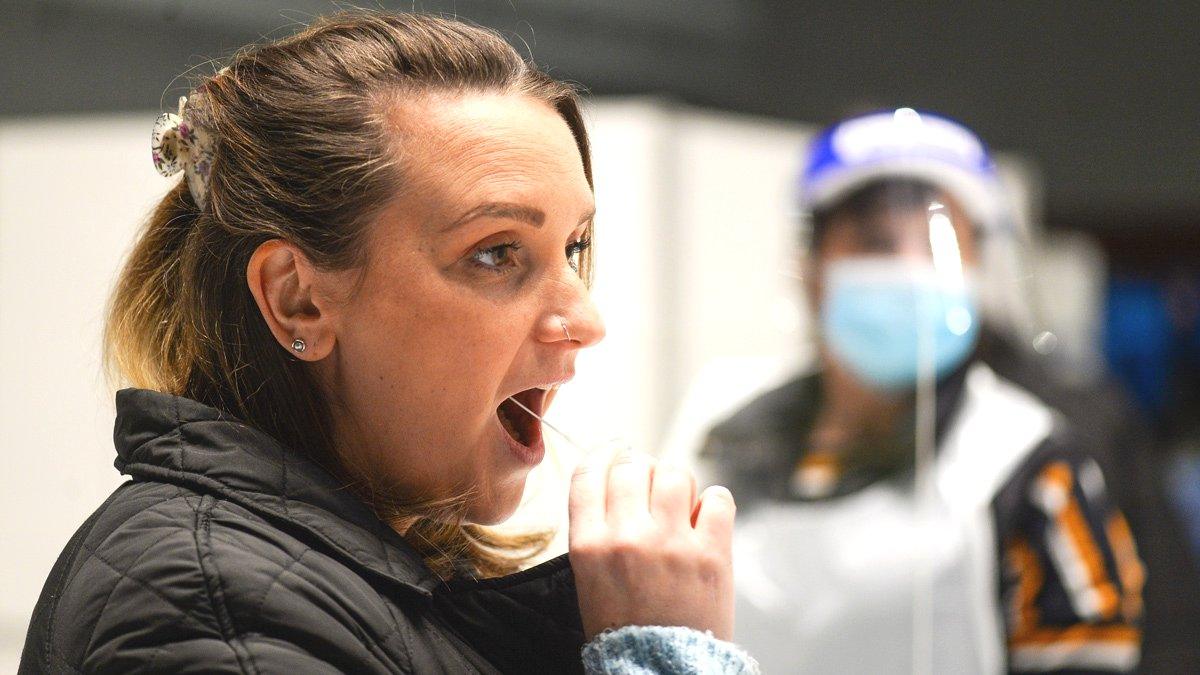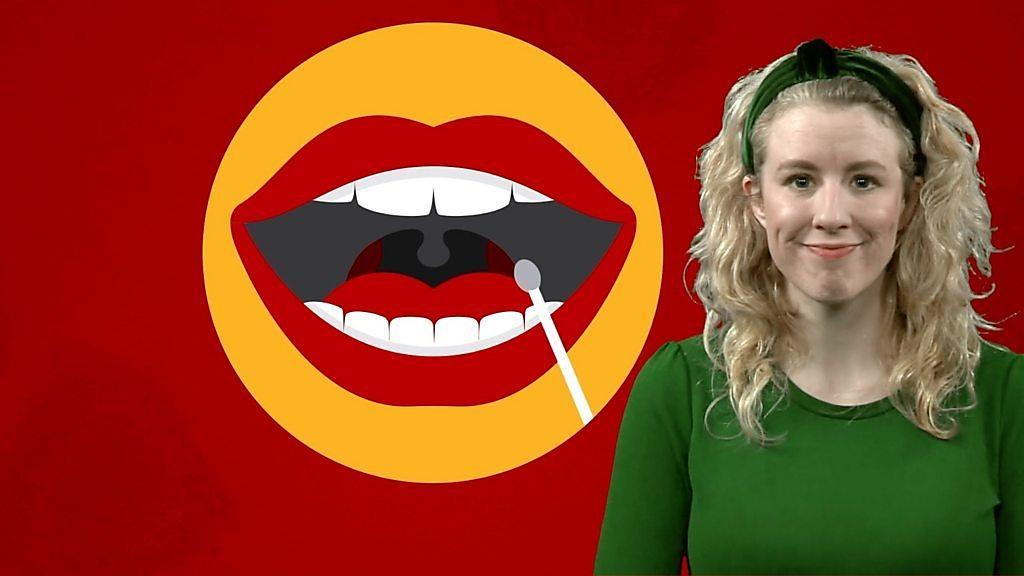Covid in Wales: What is a lateral flow test and when do I use one?
- Published
Laura Foster explains how lateral flow tests work and how to do one
Lateral flow tests are becoming an increasingly common part of life in Wales as we move out of lockdown.
They are being used in workplaces and at events to check if people have Covid-19 even if they show no symptoms.
Also know as LFTs, they are one of the tools being used, along with vaccinations, as a way of getting back to normality.
According to the Welsh government, about one in three people with Covid are asymptomatic, which can lead to the virus spreading if it is not detected.
What is a lateral flow test (LFT)?
LFTs are rapid tests similar to home pregnancy tests and produce results in about 30 minutes.
Lateral flow is a technology and with Covid it detects proteins which are present when someone has the virus.
How do you take a lateral flow test (LFT)?
WATCH: How to install the NHS Covid-19 app
Test kits are hand-held devices with an absorbent pad at one end and a reading window at the other. Inside the device is a strip of test paper that changes colour if Covid proteins are present.
You need to use a swab to take a sample from the back of your throat and from your nose.
Once you have taken the sample, you dip the swab into an extraction solution and then on to the lateral flow test's paper pad.
You do not have to send the sample to a laboratory, but you must report your test result to the NHS whether it is negative or positive.


How accurate are lateral flow tests?
LFTs have been approved to be sensitive enough to be used for mass testing, including for asymptomatic people.
However, the tests cannot detect very low levels of coronavirus in a sample. It means if you have only recently been infected, are in the incubation period, or if you have mostly recovered, the test may not give a positive result.
Test sensitivity for lateral flow tests is also dependent on the person who does the test.
In the most recent seven-day period up to 20 June, there were 178,495 LFTs completed in Wales, compared with 173,428 in the previous week. Of those, 315 were positive, compared with 217 the previous week.
What happens if you test positive?
If your LFT delivers a positive result, you need to self-isolate for 10 days and take a PCR test within 24 hours.
You can book a test online on gov.uk or by calling 119.
If your PCR test is negative, you can leave self-isolation.
If your PCR test was negative but was taken more than 24 hours after your LFT you and your contacts must remain in self-isolation for the full 10 days from the date of the original lateral flow test.
If your PCR test is positive and taken within 24 hours of your lateral flow test, you must stay in self-isolation for 10 days from the original lateral flow test result.
If you do not take a PCR test within 24 hours you must self-isolate for 10 days.
What is the difference between LFT and PCR test?

PCR, or polymerase chain reaction, is the most accurate test available for current infection. While LFTs pick up proteins, PCR tests detect the virus' ribonucleic acid (RNA), which is a molecule similar to DNA.
PCR tests are laboratory tested and can detect very tiny amounts of RNA. Results are usually delivered within 24 hours.
People with symptoms need to take a PCR test as lateral flow tests are intended for picking up additional infected cases who would otherwise be missed because they do not have any symptoms.
What other tests are there?
There are a couple of other types of test available.
The loop-mediated amplification (Lamp) tests detect the viral RNA where saliva is used as a sample, as well as swabs.
Recently a rapid version called Lampore has been used for some community testing in the UK and can be carried out in mobile laboratories.
These tests can be used for people with or without symptoms, and as they are more accurate than lateral flow tests, positive tests do not require a PCR within 24 hours.
Then there are antibody or antigen tests. These cannot be used to test for coronavirus.
Instead they look for antibodies the body has produced after someone has had the virus previously.
Who can be tested for Covid with a LFT?

LFTs are being used for regular testing of NHS and social care staff, as well as in universities, schools, care homes and other workplaces.
In Wales, you can get free LFTs for you and your household if you are a volunteer, you cannot work from home, you are an unpaid carer, your health board requires testing before hospital visits, you or your partner are using hospital maternity services, you are the parent, carer or guardian of a child in hospital.
You can also get them if you are visiting Wales from elsewhere, you are travelling to other parts of the UK or if you are going to an event which requires a test to be taken.
Related topics
- Published28 June 2021

- Published3 May 2022

- Published22 April 2021

- Published15 October 2021
